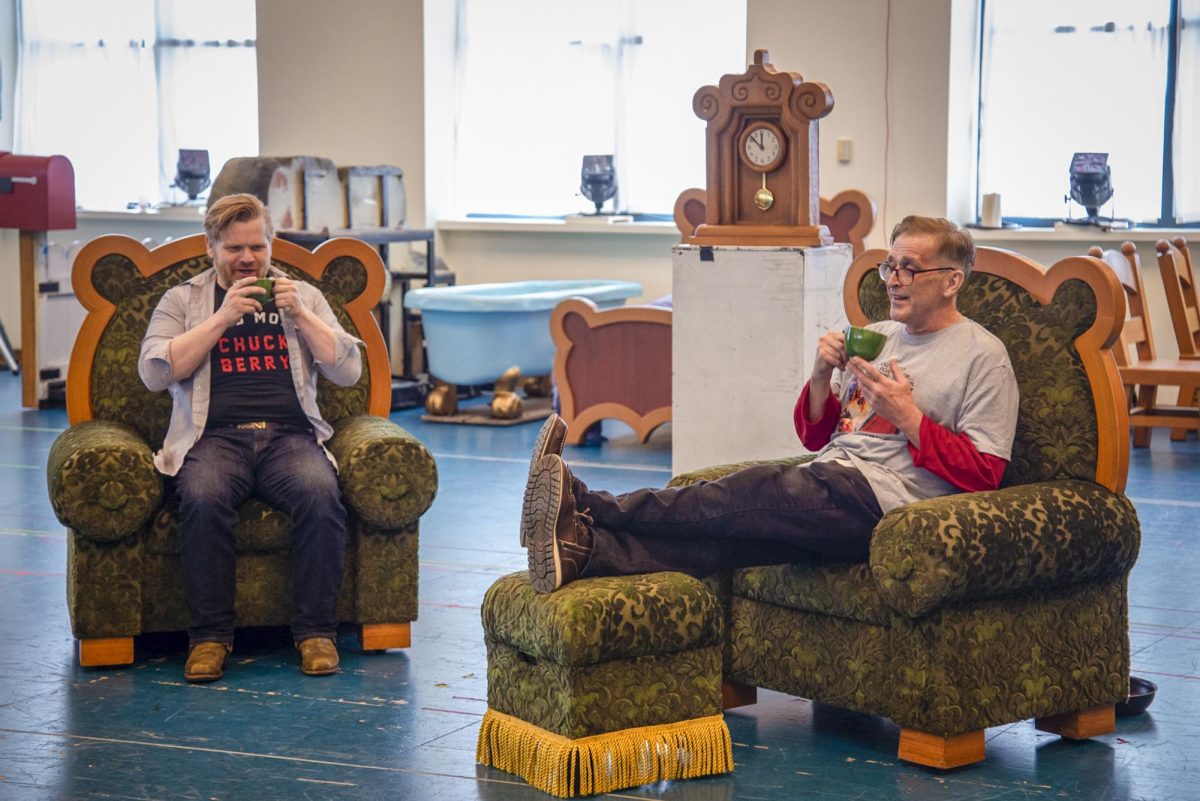
Tennessee Williams came back to life for a short time in Macalester’s production of The Glass Menagerie. From a platform elevated above the other characters, Williams sat at his desk and commented solemnly on his own play. The Macalester Theater Department describes this added text as the “readers’ version,” which was a bold stylistic choice in line with this season’s theme: “Dreaming the World Forward.”
We can imagine that Williams, known for his plays’ odd simplicity, would approve. This production breathes new life into a much loved play — bridging the usual disconnect between author and character. Several of the characters in The Glass Menagerie are representative of people in Williams’ life, so it seems exceedingly natural for him to have a close relationship with them on stage.
The Writer, played by Anna Bruijn ’18, asserts himself into the scenes with words of wisdom and prophecy. His typewriter clicks pervade most moments of tension, hinting at time’s persistence and the constant transformation of action to memory. His words encapsulate these memories in time 
While akin to a God-like figure, The Writer does nothing to reassure the characters as their lives succumb to chaos. Bruijn narrates the scene with a sentimental, almost regretful tone in her voice, which provides the audience with a unique insight into the author’s mind. Thus, this production fulfills the play’s purpose: to explore Williams’ past, and to reflect on the fragility of life.
From the very beginning, it becomes clear this family is living precariously. Members of the working class without a father-figure, the Wingfields are under financial strain. Laura Wingfield, played by Sasha Hixon ’19, is a quiet high school drop-out. She requires the support of her brother Tom played by John Stark ’16, who works at a warehouse. Amanda Wingfield, played by Melissa Feinman ’17, while a caring mother, is oftentimes cruel to her children for their failures.
Each character has flaws, whether they are being remorseless (as with Tom Wingfield, the brother) or paranoid (as with Amanda). These flaws cause the characters deep anxiety, and Williams does nothing to put their minds at ease. When Tom returns home after drinking, he “shakes a little noise-maker” towards the heavens (or rather, towards The Writer on his platform) “as if to express the tiny spasm of man in contrast to the sustained power and dignity of the Almighty.” Indeed, Williams cannot help his own characters attain their desires. As in the real world, this task is entirely our own.
In a strange way, this notion is a comfort. Watching painful arguments, broken glass and shattered hopes unravel onstage, one can find an almost indescribable peace. In the midst of life’s catastrophes, we can always take a step back and appreciate that we are not alone. Amanda remarks that “things have a way of turning out so badly,” and one can imagine Williams laughing at his own dark humor. After all, in the words of Oscar Wilde, “Life is too important to be taken seriously.”
Perhaps turning his pain into art was a form of therapy for Williams. Maybe it was all he could do, at the end of the day, to crystallize his memories into something everlasting. Being a memory play, The Glass Menagerie has sentimental qualities that validate this theory. Softly lit and accompanied by a small orchestra, the characters appear both mysterious and delicate. These elements add subtle commentary throughout the play and create the ambiance of a memory.
Tom Wingfield derives from Williams himself, occasionally standing by Williams’ desk in solidarity. Sometimes narrator, sometimes character, Stark shifts expertly between his different roles. When he argues with Amanda, the audience members can barely keep from tensing at the shoulders. Yet one is equally empathetic with Tom’s desire for freedom and for how much he loves his sister. In this way, Stark’s portrayal of both Tom and narrator are true to the complexities of Williams himself.
 Williams also had a strained relationship with his mother and his sister (Rose Williams) whose temperament inspired that of Laura Wingfield. Rose was a quiet girl, and some now speculate that she was autistic. She was wrongly diagnosed with schizophrenia, received a frontal lobotomy and later went clinically insane. Williams carried the pain of his sister’s fate throughout his life, and she appears in many of his works. Laura represents Rose before she lost her sanity, and it is clear that Laura is retreating into herself. Unable to attend business school, she only listens to phonograph records and cares for her glass collection to pass the time in the small apartment.
Williams also had a strained relationship with his mother and his sister (Rose Williams) whose temperament inspired that of Laura Wingfield. Rose was a quiet girl, and some now speculate that she was autistic. She was wrongly diagnosed with schizophrenia, received a frontal lobotomy and later went clinically insane. Williams carried the pain of his sister’s fate throughout his life, and she appears in many of his works. Laura represents Rose before she lost her sanity, and it is clear that Laura is retreating into herself. Unable to attend business school, she only listens to phonograph records and cares for her glass collection to pass the time in the small apartment.
At one point, Jim says Laura “shouldn’t have been self-conscious,” not realizing how much of a battle it is for Laura to go through every day, worried about how people will judge her. Jim, a “gentleman caller” for Laura, played by Trevor Zapiecki ’19, cannot understand why this is her painful reality. He is gregarious and confident, which has made him an object of affection. Zapiecki’s portrayal of Jim is in stark contrast with Laura’s introversion, which has prevented her from finding her place in society. Williams did not shy away from these heavy issues, writing on everything from gender roles to introversion to poverty. Likewise, the actors in Macalester’s production were not afraid to embrace their characters’ eccentricities, and the result was an incredible performance.

















Andrea Blake • Sep 12, 2019 at 6:24 am
Another thing I’ve noticed is the fact that for many people, below-average credit is the reaction of circumstances over and above their control. For example they may have been saddled with illness so that they have high bills for collections. It could be due to a job loss or maybe the inability to go to work. Sometimes divorce process can send the budget in the wrong direction. Thanks sharing your notions on this site.
Thomas Bond • Sep 7, 2019 at 4:07 pm
thanks to the author for taking his time on this one.